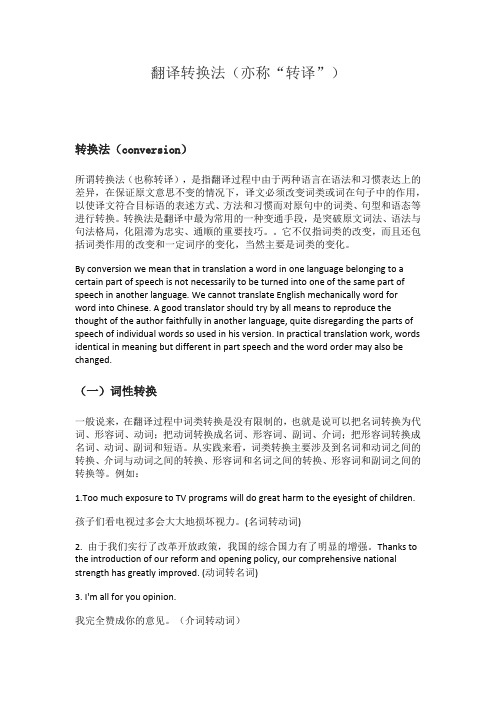翻译基础conversion-精
翻译第6讲 Conversion

翻译第6讲ConversionTranslation is a process concerning two languages. Since there are differences in the structures, grammar, and expressions between the two languages, sometimes conversion is necessary. This part is mainly about the conversion of word classes,(词类转换) conversion of sentence members (转换句子成分), and conversion of perspectives.(转换视角)Conversion of English Nouns 英语名词的转译Nouns or nominal(名词性的)forms, especially action nouns and other abstract nouns, find their wider use in English while verbs or multi-verbal forms are much preferred in Chinese. This is one of the important differences between the two languages. In translation, therefore, the conversion of English nouns into Chinese verbs, and subsequently English adjectives into Chinese adverbs, becomes one of the techniques frequently employed for smooth representation in idiomatic Chinese.English nouns can be converted into Chinese verbs in the following cases.1. 由动词派生的名词2. 具有动作意义的名词3. 以-er结尾表示身份或职业的名词English Nouns→Chinese verbsHe admires the President’s stated decision to fight for the job.他对总统声明为保住其职位而决心奋斗表示钦佩。
英译汉教程第四章conversion

English Simple or Complex Sentences Chinese Compound or Run-on Sentences
Estelmo Lews
Chinese Adverbial or Prepositional Phrase
1.He beat her black and blue.
这儿沙滩闪烁,松林掩映,远山连绵,自有一种心旷神怡的气氛。 这儿沙滩闪烁,松林掩映,远山连绵,自有一种心旷神怡的气氛。 (把英语的简单句或复合句拆成汉语的并列分句或流水句) 把英语的简单句或复合句拆成汉语的并列分句或流水句)
5.The abuse of basic human rights in their own countru in violation of the agreement reached at Helsinki has earned them the condemnation of freedom-loving people everywhere.
Chinese Adjectives
English Verbs
Chinese Nouns
4.2 Conversion of Sentence Members
Objects Prepositional Objects Predicatives Subjects Subjects Attributes Adverbials Objects Subjects Subjects Subjects Attributes Objects Predicates Complements Predicates
她的心思。 我能看出 她的心思。( different mental activities)
conversion转译法实用PPT课件

第13页/共23页
四、形容词的转换
1. 形容词→动词 在英语中, 有许多形容词并不是用来修饰主语, 而是与系动词组成谓语部分, 表示
各种意愿, 态度以及知觉,情感和欲望等心理状态, 而且可以直接或通过介词连接宾 语(从句). 在翻译时, 通常应把此类形容词转换成汉语动词 confident, certain, careful, cautious, angr y, sure, ignorant, doubtful, aware, concerned, glad, delighted, sorry …
第7页/共23页
e.g. 1) Party officials worked long hours on meagre food, in cold caves, by dim lamps.
党的干部们吃着粗茶淡饭,住着冰冷的窑洞,点着昏暗的油灯,长时间地工作 2) The government of the people, by the people, for the people, shall not perish from the earth. 民有、民治、民享的政府将永存于世
in distress, the economy will be the president’s sternest trial. 20. Beggars can’t be choosers.
第22页/共23页
感谢您的欣赏!
第23页/共23页
e.g. 1) The new situation requires the formation of a new strategy. 新形势要求制定新战略
翻译技巧Conversion

2.副词转译成名词
It was officially announced that they agreed on a reply to the Soviet Union. 官方宣布,他们就给苏联的复信取得了一致意见。 The child is developing in very way ,morally, intellectually and physicall现方式做保护处理对用户上传分享的文档内容本身不做任何修改或编辑并不能对任何下载内容负责
Conversion in English-Chinese Translation
Group 5
一.转译成动词 (一)名词转译成动词: 1.一些习语中的主体名词可以转译成动词: We mustn’t lose sight of the fact that air pollution is going from bad to worse in our city. 我们不能忽略这一事实,空气污染在我们城市中日益严重。 As the man leaned over,the driver caught his first good look at the small cat-like face. 那个人弯下腰来,司机才第一次看清那张小小的猫儿脸。 2.动词派生的名词(政论文体中出现较多): The new situation requires the formation of a new strategy. 新形势要求制定新战略。 Keep this dictionary on your desk for easy reference. 把这本词典放在你书桌上,以备随时查阅。 3.含有动作意味的名词可转译成动词: In fact,the abuse of drugs has become one of American most serious social problems. 事实上,滥用毒品已经成为美国最为严重的社会问题之一。 The film took my thoughts back to the days in junior high school. 影片使我回想起在高中的日子。 4.由动词+er构成的名词可转译成动词(不是指其身份和职业,含有较强的动作意味): His father is a non-smoker,but he is a chain-smoker. 他父亲根本不抽烟,他抽起烟来却一根接一根。 He is a lover of Chinese painting. 他热爱中国画。
英汉翻译之三Conversion-PPT文档资料

12.
The virtue of a man ought to be measured not by his extraordinary exertions, but by his everyday conduct.
1.
The The The The
problem has been solved. meeting was postponed. difficulties can be overcome. questions should be discussed.
Pattern 1
O 问题 会议 困难 问题 (被) (S) M V 解决了。 延期了。 可以 克服。 应该 讨论。
必须 加以 将在以后 予以 必须马上 予以
The temperature should be raised quickly from room temperature to 125°C. These questions should not be deliberately mixed up. Oil can be separated from water by this method.
A map was hung on the wall. Sofas were placed in the sitting-room. Trees were planted along both sides of the street. A paper butterfly was pasted on the windowpane. Pattern 2 O 地图 沙发 树 纸蝴蝶 (被) (S) V 挂 摆 栽 贴 M 在墙上。 在客厅里。 在街道两旁。 在窗户上。
翻译转换法(亦称“转译”)

翻译转换法(亦称“转译”)转换法(conversion)所谓转换法(也称转译),是指翻译过程中由于两种语言在语法和习惯表达上的差异,在保证原文意思不变的情况下,译文必须改变词类或词在句子中的作用,以使译文符合目标语的表述方式、方法和习惯而对原句中的词类、句型和语态等进行转换。
转换法是翻译中最为常用的一种变通手段,是突破原文词法、语法与句法格局,化阻滞为忠实、通顺的重要技巧。
它不仅指词类的改变,而且还包括词类作用的改变和一定词序的变化,当然主要是词类的变化。
By conversion we mean that in translation a word in one language belonging to a certain part of speech is not necessarily to be turned into one of the same part of speech in another language. We cannot translate English mechanically word for word into Chinese. A good translator should try by all means to reproduce the thought of the author faithfully in another language, quite disregarding the parts of speech of individual words so used in his version. In practical translation work, words identical in meaning but different in part speech and the word order may also be changed.(一)词性转换一般说来,在翻译过程中词类转换是没有限制的,也就是说可以把名词转换为代词、形容词、动词;把动词转换成名词、形容词、副词、介词;把形容词转换成名词、动词、副词和短语。
翻译常用八种技巧

3. 徐悲鸿画马画得特别好。 Xu Beihong’s drawings (paintings) of horses are exceptionally good. 4. 林则徐认为, 要成功地禁止鸦片买卖,就 得首先把鸦片焚毁。 Lin Zexu believed that a successful ban of the trade in opium must be preceded by the destruction of the drug itself.
1) 语言这个东西不是随便可以学好的, 非下苦 功不可。 The mastery of language is not easy and requires painstaking effort. 2) 一定要少说空话,多做工作。 There must be less empty talk and more hard work.
翻译常用的八种技巧
常用的翻译技巧
1. 重复法 (repetition) 2. 增译法 (amplification) 3. 减译法 (omission) 4. 词类转移法 (conversion) 5. 词序调整法 (inversion) 6. 分译法 (division) 7. 正说反译, 反说正译法 (negation) 8. 语态 变换法 (the change of the voices)
4. 寻寻觅觅,冷冷清请,凄凄惨惨戚戚;乍暖 还寒时侯,最难将息。 (译文1)
Seek, seek; search, search; Cold, cold; bare, bare; Grief, grief; cruel, cruel grief. Now warm, then like the autumn cold again, How hard to calm the heart!
conversion的翻译技巧---精品资料

Nouns + a(n) used as predicatives
• He is a stranger to the operation of the electronic computer. • 他对电子计算机的操作是陌生的。 • Independence thinking is an absolute necessity in study. • 独立思考对学习是绝对必要的。
动必须加以密切的观察。
Adj. ---nouns
• The + adj.: the sick病号, the poor穷人 the old, the infirm, the ill, the very young老、 弱、病、幼者。 • Others • examples
examples
• The Wilde family were religious. • 王尔德全家都是虔诚的教徒。 • They are considered insincere. • 他们被认为是伪君子。
examples
• The buildings around are mostly of modern construction. • 附近的建筑物大部分是现代化的。
Other words
• Adj. & adv. • Nouns & adv.
Adj. & adv.
• When the noun is converted into verb, the adjective modifying the noun can be translated into adverb in Chinese. • Eg. • Occasionally a drizzle came down, and the intermittent flashes of lightning made us turn apprehensive glances toward Zero. • 偶尔下一点毛毛雨,断断续续的闪电使得我们 不时忧虑地朝着零区方向望去。
